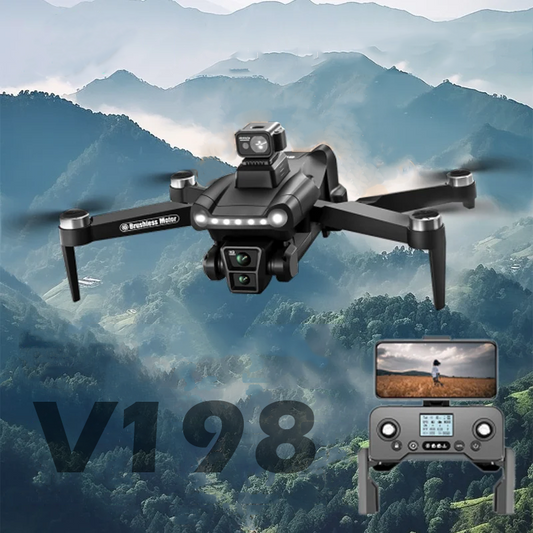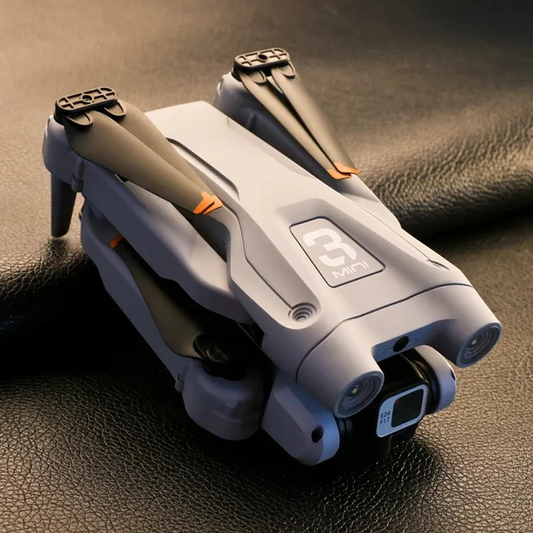Drones in Space Exploration: A New Frontier

Space exploration has always been synonymous with innovation and cutting-edge technology. As we delve deeper into the cosmos, the tools we use to explore become increasingly sophisticated. One such technological marvel making waves in the field of space exploration is the use of drones. These unmanned aerial vehicles, commonly known as drones, are rewriting the rules of space exploration, opening up new frontiers and possibilities.
The Evolution of Space Exploration

Before the era of drones, space exploration relied heavily on manned missions and remote-controlled spacecraft. The advancements in robotics and artificial intelligence have now paved the way for drones to take centre stage in our quest to understand the mysteries of the universe.
Key Benefits of Drones in Space Exploration

1.Cost-Effective Exploration:
Sending humans into space is an expensive endeavour. Drones offer a cost-effective alternative, as they eliminate the need for life support systems and other accommodations necessary for human astronauts.
2.Extended Mission Durations:
Unlike human astronauts who are limited by the constraints of life support and physiological needs, drones can operate for extended periods. This enables longer and more in-depth exploration of celestial bodies.
3.Risk Mitigation:
Space exploration is fraught with risks, and human lives are always at stake. By utilising drones, we can mitigate these risks and gather crucial data without exposing astronauts to potentially hazardous conditions.
4.Versatility in Mission Design:
Drones can be designed for specific tasks and missions, making them versatile tools for exploration. Whether it's mapping the surface of a distant planet or navigating the treacherous terrain of an asteroid, drones can be customised to meet the demands of the mission.
Applications of Drones in Space Exploration

1.Surface Mapping and Exploration:
Drones equipped with advanced imaging and mapping technologies can survey the surface of planets, moons, and asteroids with unparalleled precision. This data is invaluable for scientists studying the geological composition of these celestial bodies.
2.Sample Collection:
Drones can be deployed to collect samples from the surface of distant planets or moons. This is a crucial step in our quest to understand the origins of the solar system and the possibility of extraterrestrial life.
3.Environmental Monitoring:
Drones are equipped with sensors that can monitor the environmental conditions of celestial bodies. This includes studying the atmosphere, climate, and other factors that contribute to the overall understanding of these extraterrestrial environments.
4.Search for Extraterrestrial Life:
The use of drones enhances our ability to search for signs of life beyond Earth. They can explore areas that are difficult for traditional rovers to reach, increasing the chances of discovering microbial life or other indicators of habitability.
Notable Drone Missions in Space Exploration
1.NASA's Dragonfly Mission (Titan, Saturn's Moon):

Scheduled for launch in the near future, NASA's Dragonfly mission aims to send a drone to Titan, Saturn's largest moon. Dragonfly will explore prebiotic chemistry and extraterrestrial habitability, providing insights into the conditions that may support life.
2.Mars Helicopter (Ingenuity):

Ingenuity, a small helicopter carried by the Perseverance rover, made history by achieving the first powered, controlled flight on another planet. This groundbreaking achievement opens up new possibilities for aerial exploration on Mars.
3.ESA's Comet Interceptor Mission:

The European Space Agency's (ESA) Comet Interceptor mission plans to send a drone to study a pristine comet or asteroid. The drone will rendezvous with the celestial body and provide valuable data about the early solar system.
Challenges and Future Prospects

While the use of drones in space exploration presents exciting opportunities, it is not without its challenges. The harsh conditions of space, including extreme temperatures and radiation, pose significant obstacles for these unmanned vehicles. Engineers and scientists are continually innovating to develop drones that can withstand these conditions and push the boundaries of exploration.
Looking ahead, the integration of artificial intelligence and machine learning will play a pivotal role in enhancing the autonomy of space drones. This will enable them to make real-time decisions and adapt to dynamic environments without constant human intervention.
Drones are ushering in a new era of space exploration, expanding our reach into the cosmos and uncovering the secrets of the universe. With their ability to navigate challenging terrains, collect crucial data, and operate for extended durations, these unmanned aerial vehicles are proving to be invaluable assets in our quest to understand the cosmos.
As technology continues to advance, we can expect more ambitious drone missions that push the boundaries of what is possible in space exploration. From exploring the icy moons of distant planets to studying the atmospheres of exoplanets, drones are set to become indispensable tools in unravelling the mysteries of the cosmos. As we look to the future, the marriage of robotics, artificial intelligence, and space exploration promises a new frontier of discovery and understanding. The sky is no longer the limit—it's just the beginning.
Explore a variety of drones at our online drone store.
Happy Flying!









